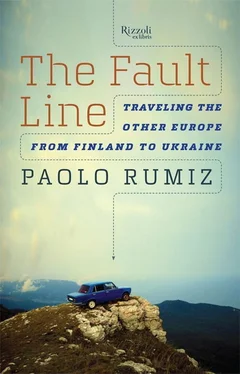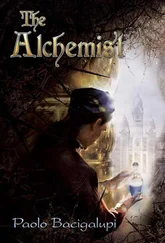I walk among the empty windows like an insect in the eye sockets of a dead man. It must have all happened in a few days, like an evacuation. The only thing missing are bomb craters. The central heating has been turned off for fifteen years, and the houses that are still inhabited are outfitted with woodstoves whose chimney pipes punch through the surviving windows and blacken everything.
Vera came here from Siberia forty years ago, and now she has no desire to go back. “Russia or Latvia, it doesn’t matter to me. All I want is a piece of land.” She laughingly insists that I chew on a piece of an herb called ukrop , which is good for “male potency”; then she recites a list of mushrooms and berries with incomprehensible names, her borderland sylvan treasures. She explains to Monika how to cook boroviki (porcini mushrooms) and beryozovikiye mukhoviki (mushroom-filled pastries) and shows us her tomatoes, potatoes, carrots, and strawberries. But she’s worried about the fate of the forest. She’s afraid it’s all going to be taken away from her in the privatization wave. “They say there’s a European project, but who’s going to get all of this, we still don’t know.” From Murmansk to here, the anxiety I’ve heard about land going to seed has all been in the language of Tolstoy.
The musical merriment of Latvia explodes again in Rezekne, which wakes up with sunlight and wind on market day. Geese, garlic braids, beets, and something in the air that’s old and peaceful. There are no advertising billboards, and their absence highlights the beauty of the old stonework, aside from relieving the anxiety of consumption. At the top of the hill, on the main street, a statue of the Blessed Mother—equidistant from the Catholic church and the Orthodox one—bears the inscription UNITED FOR LATVIA. I read into it something ever harder to come by in this lame Europe: the acceptance of plurality, the sign of a well-functioning frontier. The women out on the street are pretty, lively, the fertile fruit of bastardization. “ Gemischtes Blut ist das Beste ,” my old German teacher, expelled by the Sudetans in 1945, used to say. “Mixed blood is the best.” She used to say that women are an infallible indicator of the bastard factor in Europe.
Beauty emigrates from the monolithic ethnic groups in search of spaces where it can blend. Even back then, I had my own map of this feminine universe, tested in numerous journeys. I knew that the beauty of nations like France or Italy couldn’t compete with the beauty expressed by melting pots like Belarus, Dalmatia, or Vojvodina, north of Belgrade.
In Latvia, the Jews and the Germans are still in the air. Their traces are everywhere. In the faces, in the houses, in the cuisine, and in the music. We happen upon a singing funeral, with the deceased taking his leave in a polyphony of notes that are soft, intimate, superbly rotund. The outdoor market is a fair of the contaminations forgotten by globalization. A triumph of the senses compared to the alimentary anemia of the West. Ah, grohufka , a hot soup of dried peas and chives, potatoes, carrots, and sour cream! And what to say about the cold borscht made from beet leaves and roots! And then the cherries, strawberries from the woods and mountains, and the candies made from milk and honey, as big as three normal candies and featuring the image of a cow, a jumbo-size sublimate of sweetness. The Latvian cow is worthy of a monument. She shows up on coins, too. That in itself is enough to make you love this country. Lithuania has a horse in harness with a warrior in the saddle; Russia, the magniloquent two-headed eagle of Byzantium; Estonia has three lions superimposed like English heraldic coats of arms; Poland, a crowned eagle with a cross between its paws. Latvia makes them all look ridiculous with its cow quietly grazing in a pasture, under an archipelago of migrating clouds.
The Chebureki Inn, next to the marketplace, has a counter that looks like an iconostasis, a redbrick wall that separates the dining room from the kitchen as the church from the altar. In the middle of the wall there is an opening where, instead of the pope, there is a buxom woman intent on squeezing beer from the tap. On the sides, it has two symmetrical doors where, in place of the beardless deacons busying themselves with incense, florid blond waitresses come and go, carrying trays loaded with all God’s bounty. Even at the tables, the women are a clear majority, almost all of them vendors, taking a break from the market to have a bowl of soup. Estonian silence? The freezing cold wind of the Gulf of Finland? The blushing of the silent people of the North? Now distant planets.
Here it is a triumph of chattering, shout-outs, greetings. The challenge is not striking up a conversation but keeping to yourself.
In comes a blond saleswoman by the name of Nelly. She sees that I’m writing and, curious, she comes right up to me and sticks her eyes on my notebook, shooting into my nostrils her entire hormonal code and the aromas of the open-air market. Strawberries, milk, chives, potatoes, and spicy salami. She starts in on me in Russian and gives life to a dialogue that in Tallinn would have been inconceivable, with Monika acting as interpreter and trying not to laugh.
I tell her about the journey we’re making. I say, “This place of yours is magnificent, it nourishes the soul.”
But Nelly cuts to the chase. She replies, “You’re a handsome fellow,” and it’s as though she had said, “This Italian rooster is mine for the plucking.”
I respond that I’m an old codger with a two-week-old beard and that I’m in urgent need of a barber so I can go out in public.
Nelly: “What barber? Come to my house in the country, and I’ll take care of your beard.” Monika translates, undaunted.
Next comes a friend of Nelly’s, as brigandesque as she. Her name is Janna. Nelly calls out to her and says, “Come here, come here, this guy’s Italian.”
So Janna takes the field, too. “What do you do for work?”
“I’m a writer,” I reply.
The two look at each other surprised. Up to now, they’ve met only rich wholesalers or chain-store reps. Who knows, they wonder, how rich a writer is.
Janna, decisively: “Come out to our ranch. We can milk the cows together, and then drink the warm milk.”
Nelly: “Come on, I’ll teach you how to milk; you’ll see how easy it is.”
Janna draws a map on my notebook of how to get to their town and writes down her name and phone number. She continues: “I’ve got a special tie to Italy. A dear friend of mine is married to a Sardinian.”
I tell them that Italy is beautiful, but we like the countryside of the Baltic countries. The smells, the people.
Nelly won’t let up. “We can spend a wonderful day together. Come to our place. Tomorrow is not a market day.”
There’s no escape. I keep repeating my we , but the two of them go right on with the singular you . They’re in the market for an Italian chicken. They look at Monika as though she’s a secretary/interpreter, and it’s easy to understand why, because such is the usual companion of the Italian man traveling on business.
Telling them that we have our own work deadlines is useless, so we don’t have any choice. We’re forced to get out of the fix in English, making a false promise of an appointment for the next day. With all best wishes to Janna, Nelly, and their milk and honey candies.
We have arranged a meeting at a café in the center of town with a Latvian Pole, an attractive, distinguished-looking woman named Regina. She explains to us that Rezekne is actually part of one of the many cross-border regions that were broken up by the empires and consequently erased from the maps. “Here we are in Latgale,” she explains, “a place of Lutherans, Orthodox, Catholics, and Jews, whose plurality is a headache for the Latvians of Riga.” Russian has been the lingua franca here for centuries. The Soviet occupation has very little to do with it. “It was full of Germans here, and Hitler saw those Teutonic advance guards as the prototype of the new Aryan race, cold colonizers.”
Читать дальше












